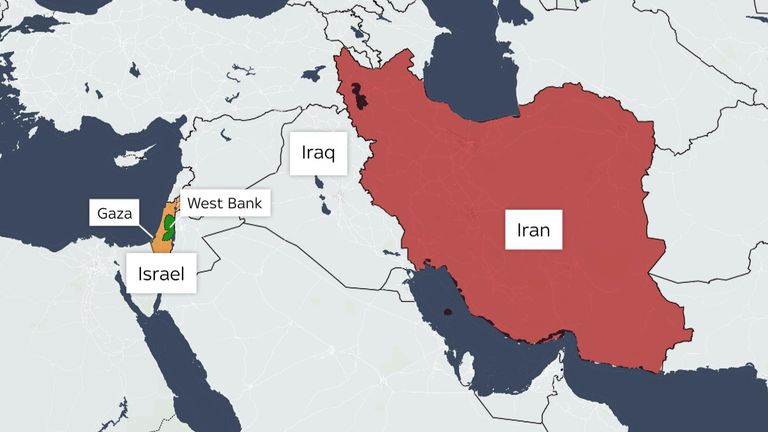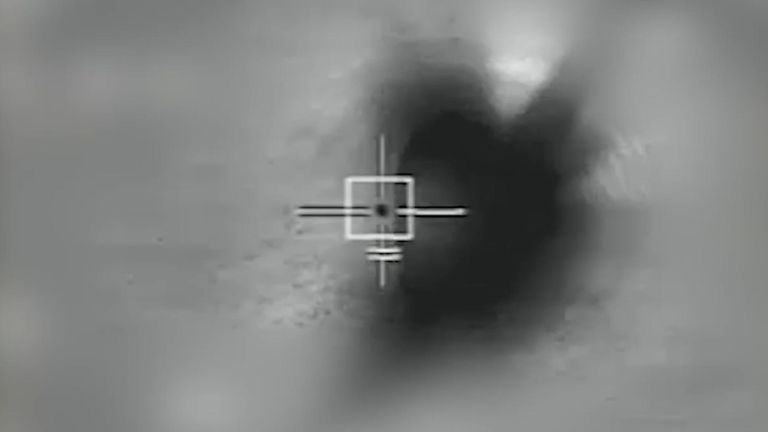No military options come without complications and though the Israeli Defence Forces (IDF) are undoubtedly strong, they face many complications in considering whether, and how, to strike back against the barrage of drones and missiles Iran launched against them at the weekend.
Many strategic analysts in the IDF argue that the Iranian attack showed that deterrence had failed and therefore must be restored with a strong attack that would make Israel‘s enemies fear to provoke it again.
Others have maintained that running the risk of Israel being pulled into a greater conflict with Iran at such a critical juncture in the Gaza war could result in their falling into exactly the trap Hamas was trying to set for them on 7 October – a general war that would threaten Israel’s very existence.
Follow latest: Middle East live updates
So Israel’s response will have to be carefully calibrated.
A non-military response might involve economic and diplomatic pressures, building on the wide international consensus that roundly condemns this barrage of drones and missiles that Iran fired at Israel.
Please use Chrome browser for a more accessible video player
1:21
‘All sides must show restraint’
Such an approach would win favour in the international community but might prove very difficult for Prime Minister Benjamin Netanyahu to sell to his hardliners.
A military response might range from attacks on Republican Guard individuals and facilities as they operate in Iraq, Syria and Yemen.
This would act as a signal to Tehran, but not attack Iranian territory directly, and therefore only likely provoke a rhetorical response from Tehran.

A much stronger military response might involve attacks inside Iran itself.
Read more:
UN ambassador: Israel ‘knows what our retaliation would be’
What are Iran’s military capabilities?
Iran attack was ‘declaration of war’
This would represent a powerful escalation. And it would be complicated.
IDF aircraft would have to fly over 600 miles just to reach the Iranian border, and would have to transit Iraq, Jordan or Saudi Arabla – who would certainly not give them legal overflight rights across their territories.
Please use Chrome browser for a more accessible video player

0:49
Moment Israel intercepts Iranian drones
Alternatively, Israeli aircraft might avoid land by flying all the way down the Red Sea, round the Gulf of Aden and into the Persian Gulf, to arrive over Iranian territory from the south west. The distances involved would be more than doubled and the attendant risks greatly increased.
Or again, Israel could fire rockets and missiles at Iran. This would remove any overflight rights problems as long as they were high-flying ballistic missiles, not cruise missiles.
But the damage they could do would be limited, the numbers employed could not be great, and the whole effect of their use would be subject to interpretation.
This content is provided by Spreaker, which may be using cookies and other technologies.
To show you this content, we need your permission to use cookies.
You can use the buttons below to amend your preferences to enable Spreaker cookies or to allow those cookies just once.
You can change your settings at any time via the Privacy Options.
Unfortunately we have been unable to verify if you have consented to Spreaker cookies.
To view this content you can use the button below to allow Spreaker cookies for this session only.
👉 Listen above then tap here to follow the Sky News Daily wherever you get your podcasts 👈
There is no real substitute – in these sort of exchanges – for aircraft, flying towards their targets and then releasing their bombs and missiles on the basis of the immediate circumstances on the ground.
Whatever the Israeli government decides to do – and it will decide to do something – it will have to square it within its own fractured domestic politics, with its allies, and with the wider world.
And then it will have to think what effect it might have on Tehran.







